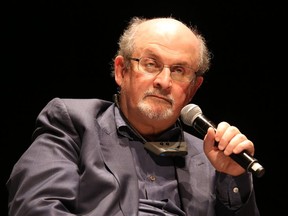Raheel Raza: A satanic attack on freedom — Salman Rushdie remains a giant
A cowardly and vicious assault

Article content
“What is freedom of expression? Without the freedom to offend, it ceases to exist” — Salman Rushdie
On Friday, author Salman Rushdie was scheduled to give a lecture at education center Chautauqua Institution in southwestern New York, when a man ran up to the stage and attacked him with a knife in the neck and abdomen. Police arrested a suspect named Hadi Matar, 24, from Fairview, New Jersey.
No motive or charges have yet been confirmed by police but according to the New York Post, Matar is accused of being “sympathetic to the Iranian regime and the Islamic Revolutionary Guard.”
But we know that this attack was cowardly and vicious and it was an attack on freedoms — something that Rushdie has fought for and written about for decades.
When we hear the name “Salman Rushdie”, three concepts immediately pop into our minds.
Ayatollah Khomeini, Satanic Verses and Blasphemy.
But Salman Rushdie is so much more. He is a literary giant.
Born in Mumbai in 1947, the British-Indian writer attended The Rugby School, a boarding school located in Warwickshire, England. He then attended King’s College at the University of Cambridge, where his father had studied before him.
Rushdie pushed the margins of culture by addressing issues in his writings which were considered taboo. He uses a wry sense of humour, magical realism and his own Indian culture to explore ideas from identity, history and politics to religious themes. His work is unique and challenging, but not everyone’s cup of tea as his writing style is out of the ordinary.
Rushdie made his mark as a writer of consequence with his second novel, Midnight’s Children, published in 1981. For this he received the Booker Prize and the novel went on to become a global success. (Over a million copies were sold just in UK). In this he addressed the partition of India and Pakistan (a subject not much talked about) woven into a story. Some say it’s his own story since he was also born in 1947.
In 2007, Rushdie was knighted by Queen Elizabeth II for his services to literature, making him Sir Ahmed Salman Rushdie. He has won five Booker Prizes.
A prolific essay writer, Rushdie also spread his talents to writing children’s books using magical, enchanted themes in storytelling in a way that expresses his own unique talents.
In 1988, Rushdie published his now “infamous” novel The Satanic Verses. All hell broke loose in the Muslim world. The late Iranian leader Ayatollah Khomeini accused the author of blasphemy and in 1989 issued a fatwa (religious edict) against him, putting a bounty on his head which (according to some reports) amounts to $3.3 million.
All over the Muslim world, especially in places like Pakistan, there were explosive rallies and calls to kill Rushdie. Ironically if you asked the protesters whether they had read “Satanic Verses” you would find that most had not. It was a mob action but violent and angry. In 1991 two translators of the book were stabbed, one fatally.
Why?
Khomeini wanted to attract political attention and Rushdie became a convenient scapegoat. This was a time when we Muslim Reformers saw the clear distinction between Islam and Islamism (political Islam) because Khomeini was using this as a purely political move. However, it picked up traction and soon Rushdie had to go into hiding while Scotland Yard provided security for him.
From a literary point of view, Rushdie had opened a pandora’s box by writing in Satanic Verses about something that is taboo in the Muslim world. In the novel, the prophet Muhammad appears, initially adding a verse to the Quran that describes a trio of pagan deities local to Mecca, then later disavowing these verses as having been dictated to him by the devil. This was considered blasphemous.
In 1998, Iranian president Mohammad Khatami rescinded the fatwa but the harm had been done. He could not put the genie back in the bottle. Islamists world over had made it their mandate to get rid of Rushdie and blasphemy laws started being used with a vengeance against Muslims and non-Muslims alike. Today there are hundreds of victims of blasphemy laws languishing in jails in Pakistan.
The angst against Rushdie continued. Not to be fazed by the attacks against him, Rushdie continued to write from his hiding places. He moved to the USA in 2000. He is a former president of the literary and human rights organization PEN America. He is a vocal and active defender of freedoms. In an interview with Deutsche Welle, he said “We must defend our valuable and hard-won freedom, we have to fight for it, if need be”
He wrote his memoir in 2012 “Joseph Anton” which was nominated for the UK’s top nonfiction award, the Samuel Johnson Prize. His next novel “Victor City” is due to be published in February 2023.
Muslim Reformers are appalled and condemn the assault on Rushdie. Asra Nomani, member of the Muslim Reform Movement writes on Twitter: The Muslim Reform Movement condemns the attack on author Salman Rushdie. Free speech is not a crime. We must all reject the extremist interpretation of Islam that puts a death sentence on innocents exercising free speech rights. May the power of the pen prevail.
We pray for his speedy recovery.
Raheel Raza is co-founder of the Muslim Reform Movement











Postmedia is committed to maintaining a lively but civil forum for discussion. Please keep comments relevant and respectful. Comments may take up to an hour to appear on the site. You will receive an email if there is a reply to your comment, an update to a thread you follow or if a user you follow comments. Visit our Community Guidelines for more information.